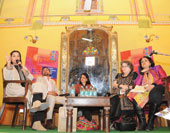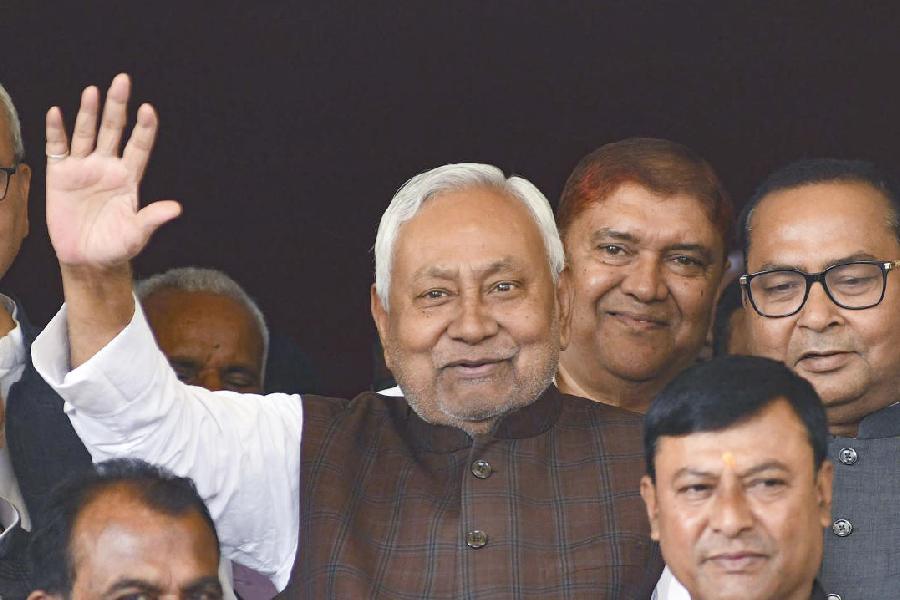 |
| From left: Actors Shabana Azmi and Rahul Bose, festival adviser Surina Narula, French writer Catherine Clement and writer-curator Alka Pande at the 5th DSC Jaipur Literature Festival; (below) one of the gates of the 34th Calcutta Book Fair. Picture by Sanjoy Chattopadhyaya |
 |
It looked very different from the Calcutta Book Fair. The lane off Mansingh Road that led to Diggi Palace ended in a bright welcome gate in hues of pink, orange, red and purple. Through the entrance that remained chock-a-block with Innovas, Honda Civics. Bright festoons and streamers with twinkling lights competed with visitors in Rajasthani prints and ethnic accessories.
A five-year-old squatted on the grass in front of the main podium, oblivious to the crowd straining to catch every word of Wole Soyinka. A deliriously happy William Dalrymple danced with wife Olivia to the Nagara beats of Nathoo Lal Solanki that fused seamlessly with Titi Robin’s Mediterranean strains.
The fifth edition of DSC Jaipur Literature Festival was about dance, music and films, if also about some books, mainly titles written in English or “bhasha” writings in English translation. I am just an old, desi book.
Was there a place for me in Jaipur? I plonked myself in a corner of the bookstore Full Circle, the only bookshop, which had imported titles and sold out all its stock at the end of the five days. I looked.
Celeb quotient
I saw a jaded Deepti Naval in kosha silk facing the camera, or a heavily made up Malavika Tewari, a soap star of yesteryear, in leotards, along with school students in uniform queuing up to get their copies of Captain Corelli’s Mandolin signed by Louis De Bernieres or a budding author with a new manuscript talking to a representative of a publishing house.
It reminded me of the great Indian wedding. The organisers actually said so too. The festival is “like the Great Indian Wedding. It has over 30,000 to 35,000 registrations, where delegates, authors, invitees and the press are wined and dined through five days of the festival,” said Sanjoy K. Roy, festival producer, to reporters.
He pegged the festival budget at Rs 2.4 crore this year, which made it a good Great Indian Wedding. “Here, after 6pm authors shut shop and the stage is given over to music and dancing,” he added. That’s what also happens at all respectable international book events.
Then William Dalrymple spoke. “It is more of an author-driven festival,” said Dalrymple, a director of the festival. “We had to turn down more than 100 authors who wanted to take part in the festival this year,” said the star British writer who specialises in India.
“Not just English language authors, we have bhasha writers like Mahasveta Devi, Hetu Bharadwaj, Mridula Bihari, Bhagwant Atlani, we have representatives from Dalit literature like S. Anand, Kancha Ilaiah, P. Sivakami,” he added.
So I queued up for Wole Soyinka’s autograph.
My next stop: the Calcutta book fair. It is a different event with a different aim.
It was very dark.
As cars queued up to park in the allotted space, clouds of dust engulfed the area.
Many publishers, of course, stay away because of the dust. “Books get damaged and we cannot afford to incur losses,” Thomas Abraham, the managing director of Hatchette India, was heard saying. Abraham is satisfied with the arrangements this year, though, and Hatchette will participate in the fair from next year. HarperCollins promises the same.
Dirt and dust
But the homegrown Seagull and Stree have also chosen to stay away. Absentee publishers don’t like the dust and the poor infrastructure. They feel the Publishers’ and Booksellers’ Guild should realise that it is in its own interest to shift the fair days so that they don’t coincide with the World Book Fair at Pragati Maidan that started on Saturday.
“Perhaps the guild doesn’t care but then we also don’t care to be a part of this fair which seems to be getting more and more provincial,” says Mandira Sen of Stree, which publishes books on gender and social issues.
So I decided to take a stroll. I entered from Gate 4 and was confronted with broken, unpaved paths with narrow aisles between rows of stalls. The stalls were unlit and unfinished till Thursday with workers hammering away. At places the aisles between the stalls narrowed dangerously, raising fears of a stampede in case there was a fire. With 6,09,840sq ft of Milan Mela at the Guild’s disposal, the stalls could have been better laid out.
The organisers swear by the Calcutta Book Fair. It is all about “reaching out to the readers”, says Tridib Chatterjee, the honorary general secretary of the guild, which has a fair budget of Rs 1 crore this year.
“It is the only book fair that has a direct turnover to the tune of Rs 1.7 crore (2009 figures). We retail directly to the readers,” he adds. The fair also trades in buying and selling rights and licences, says Chatterjee.
The book fair is the only hope for little magazines, he adds.
Some publishers are thankful to the book fair. “I started my publishing career with Calcutta Book Fair,” says Adheer Biswas of Gangchil, who was awarded the Most Promising Publisher of the year award by the Guild this year.
To be honest, I don’t feel out of place here. I can even make my way into a number of stalls. But isn’t it all a bit too provincial? I could do with a bit of meeting Wole Soyinka.
International?
The guild, of course, said the fair was international. “We have Mexico as the theme country and Mexican authors like Alberto Ruy Sanchez and Margo Glang are visiting. We organised a business meet for the Mongolian publishers’ delegate on Friday,” said Chatterjee.
A huge unfinished structure in the middle of the fair was supposed to have housed permanent washroom facilities, which unfortunately has not been completed. A few yards away is the UBI Auditorium where a handful of people remain standing while the chairs go empty. The auditorium comes in use at the inaugural and closure of the fair.
So I queued up and had the fish “butter” fry at the Benfish stall.
smart mart
 |
The mother of them all of course is Frankurt Book Fair, where if you aren’t seen you are not a serious author/publisher/agent/reader. So all roads lead to Germany in the second week of October, when the fair is held. The first three days are reserved for trade and the public can visit only in the last couple of days.
“Frankfurt Book Fair is a huge affair. It’s spread over eight halls on two floors with vertical and horizontal escalators. It’s like taking up two airport buildings,” says Mandira Sen of Stree, a book publisher from the city who is a regular at the Frankfurt fair. “It’s very intimidating, the people, their language, the space. Before World War II it was the Leipzig Book Fair. After the war, Frankfurt is the free world’s exchange of ideas.”
The primary business activity at Frankfurt is buying and selling of rights and licences. It is an important marketplace for books, media rights and licences worldwide. More than 7,300 exhibitors from 100 countries, 299,000 visitors and over 10,000 journalists visit the fair each year.
It helps publishers grow their business, expand their network, find new types of content like digital content, get to know the publishing landscape of the guest of honour and avail information on emerging markets worldwide.
Sen, who primarily visits the fair to negotiate for rights, says: “It’s important that you prepare before you visit the fair. Otherwise, you won’t get much done. You should fix up your appointments by June or July and be ready to meet the publishers/agents at the appointed hours. You should know beforehand the rates for selling and buying and negotiate likewise.”
The evenings are devoted to literary events, there’s music, book readings, book prizes. The Deutsche Book Prize announced during the fair is a prestigious event with a long pedigree. Indian writers writing in English like Amitav Ghosh and Arundhati Roy are promoted in a big way at Frankfurt. “It’s a jamboree, there’s a crafts fair, a lot of food, expensive restaurants. If you have good relationships with the western publishing companies you get invited to parties,” says Sen.
audience for everyone
 |
The Edinburgh International Book Festival is “the largest of its kind in the world”. Not in space. It’s small compared with Calcutta Book Fair. You can bump into Sean Connery. It takes place in the last three weeks of August every year, as part of the general Edinburgh Festival, in Charlotte Square , in the centre of Edinburgh , Scotland’s capital. The festival hosts a series of cultural and political talks and debates, along with its well-established children’s events.
It’s a bright, happy, kind place. Authors can be followed. A Bengali author, also reading in Bengali, can be listened to with utmost interest. People drive down from other cities, if not countries, to attend the book festival and the festival.
The book festival originally took place in a tent in Edinburgh in 1983. At first a biannual event, the festival became an annual affair in 1997. It is now a large (and ever-growing) international event, central to Edinburgh’s acclaimed August arts celebrations. Perhaps as a result of this, Edinburgh was named the first Unesco City of Literature in 2004, following which Calcutta has been trying its bit to be thus nominated.
There are over 700 events for adults and children in the three weeks that the book festival runs. They range from writing workshops, education events, panel discussions, to talks and performances by international writers, poets, musicians and thinkers.
The British Council in Calcutta takes author delegates to the Edinburgh Book Festival every year. “It’s a session of book-readings, discussions and other events. In the evenings there’s music. We take authors’ delegates to the Authors’ Yurt or tent where eight to nine like-minded authors sit, exchange ideas, have coffee. It’s an intimate space where they get to talk to each other,” says a British Council employee who takes the delegates to the festival each year.
There are 200 seats in the tented auditoriums, which are generally full. Events get over in time, without anyone having to remind anyone. “The only grouse with the festival, as with most international book festivals, is that youngsters are missing,” says the British Council employee.










